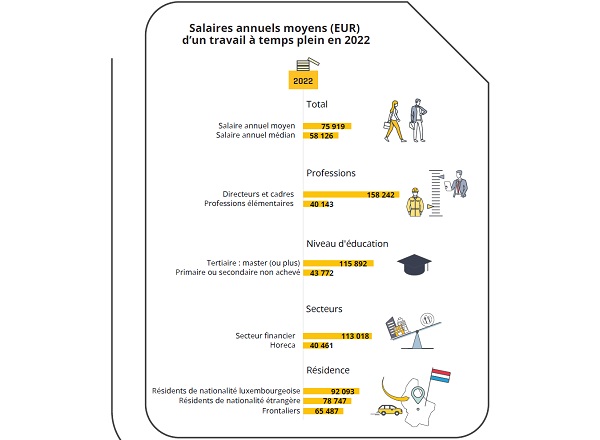 Credit: STATEC
Credit: STATEC
On Tuesday 9 July 2024, Luxembourg's national statistical institute, STATEC, published a report about salaries in the Grand Duchy in 2022.
In 2022, a full-time employee having worked all year earned on average €75,919 before tax (gross). This amount includes all remuneration received (e.g. bonuses, overtime and thirteenth salary).
The gross median salary was €58,126 per year. STATEC noted that this means that half of employees earned less and the other half earned more than €58,126.
The report (based on a study) found that the most profitable sector of activity in Luxembourg in 2022 remained (as in 2018) financial and insurance activities, with an average gross annual full-time equivalent salary of €113,018. This was followed by education (€111,362), the sector of specialised, scientific and technical activities (€105,145) and public administration (€100,458).
The sectors with the lowest salaries remained the hospitality sector with an average gross annual salary of €40,461, the administrative and support services sector (cleaning, security, etc.) with €48,679 and the construction sector with €49,587.
The average gross annual salary in finance was almost 50% higher than the average for the entire economy, and salaries paid in this sector were on average 2.8 times higher than those in the hospitality sector.
STATEC attributed these significant differences between branches of activity in part to employees having different profiles in terms of level of education, professions, etc. For example, 81% of employees in financial and insurance activities held a university degree, compared to 11% in the hospitality sector.
The average gross annual salary of a full-time employee amounted to €75,919 for the economy as a whole in 2022. STATEC noted that this amount must be qualified by the fact that the median annual salary (€58,126) was much lower than the average salary.
For the economy as a whole, one employee in ten earned less than €33,110 (gross) per year. The annual gross unskilled minimum social wage stood at approximately €27,591 in 2022. At the other end of the distribution, one employee in ten received more than €135,797 (gross) per year.
The top 1% of employees who earned the most (i.e. one employee in 100) earned more than €284,715 (gross) per year - around ten times the unskilled minimum social wage.
Looking at the evolution of salaries between 2018 to 2022, the report found that the average gross annual full-time equivalent salary increased by 3.6% per year on average for the entire economy, i.e. a total increase of 15.4%.
In terms of education, an employee with a bachelor's degree earned 22% more than the average employee in 2022. This gap increases to 53% for employees with a master's degree or higher qualification. Conversely, an employee without a university (higher education) degree generally earned less than the average. An employee with a secondary school diploma earned around 19% less than the average; for individuals who left school without a diploma, this gap widens to 42%.
Moreover, the full-time equivalent gross annual salary increases with the size of the company. An employee of a company with between ten and 49 employees received on average a gross annual salary of €66,120 in 2022, while an employee of a company employing 1,000 employees or more received €92,286. The pay gap between the two is 40%.
A foreign resident earned on average 86% of the salary of a Luxembourgish resident while a cross-border worker earned 71% of a Luxembourger's salary. The average salaries of Luxembourgish residents exceeded those of the other two groups in most sectors of activity, with a few exceptions. Foreign residents did however have the highest salaries in the sectors of commerce, financial and insurance activities, as well as specialised, scientific and technical activities. Cross-border workers received higher salaries in health and social care as well as in public administration. STATEC attributed the higher average salary of cross-border workers in public administration to the fact that around 44% of cross-border workers in this sector had a tertiary level qualification (bachelor's degree or above), compared to 29% of Luxembourgish residents.









